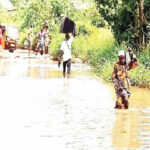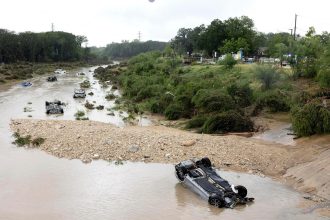Residents and motorists in Lagos are grappling with severe disruptions caused by Monday’s early morning torrential rainfall, which triggered flash floods across the metropolis.
Major roads were submerged, homes inundated, and traffic brought to a standstill as the downpour persisted into the morning.
The Nigerian Meteorological Agency had earlier warned of thundery and rainy conditions from Monday to Wednesday, predicting possible flash floods in several states, including Lagos.
In its Sunday weather outlook, NiMet forecasted morning thunderstorms in northern states like Adamawa, Taraba, Sokoto, and Kano, while Lagos and other southern regions were expected to experience cloudy skies with light rains. The agency specifically highlighted Oyo, Ogun, Edo, and Delta as high-risk areas for flooding.
NiMet issued safety advisories, urging the public to avoid driving during heavy rain and recommending that flood-prone states activate emergency response systems.
“Ensure warm clothing for vulnerable persons due to low night-time temperatures, and fasten loose objects to avoid collisions,” the agency stated. It also advised disconnecting electrical appliances, avoiding tall trees, and staying updated via NiMet’s website (www.nimet.gov.ng).
According to Vanguard, checks revealed extensive flooding on key routes, including the Lagos-Abeokuta Motorway, Ikorodu Road, Apapa, Lekki, Agege, and the Long Bridge along the Lagos-Ibadan Expressway. Many vehicles were stranded, and commuters faced hours-long delays.
A motorist, Alhaji Abu, described the ordeal at Odo Iya Alaro Bridge in Ikorodu, where floodwaters made navigation nearly impossible at dawn. Similarly, Alakuko residents reported gridlock due to submerged potholes on the Lagos-Abeokuta Motorway.
In Gberigbe, Ikorodu, homes were flooded, forcing residents to bail out water. Modupe Akinbiyi, a resident, lamented, “We experience heavy floods every rainy season. We’ve complained to the government repeatedly, but nothing has been done.”
On Lagos Island, Anthony Azubuike criticized poor drainage maintenance, noting that cleared waste often finds its way back into clogged channels.
Motorist Kunle Oyebode added, “The roads are impassable. Many vehicles broke down, while others barely managed to navigate the floods.”
Despite the chaos, the Lagos State Ministry of the Environment and Water Resources urged calm, assuring residents that the flash floods would recede. Commissioner Tokunbo Wahab reiterated the state’s preparedness, citing collaborations with NiMet and the Ogun-Oshun River Basin Development Authority to monitor water levels and mitigate flooding.
He advised residents in low-lying areas like Agiliti and Ajegunle to relocate upland if necessary and emphasized the importance of proper waste disposal to prevent drainage blockages.
Wahab also addressed misconceptions about flooding, stating, “Flash floods are normal in coastal cities and usually drain quickly. Sensational reporting only causes panic.” He warned against illegal construction on drainage paths and called for compliance with safety measures for billboards and telecommunication masts during storms.







